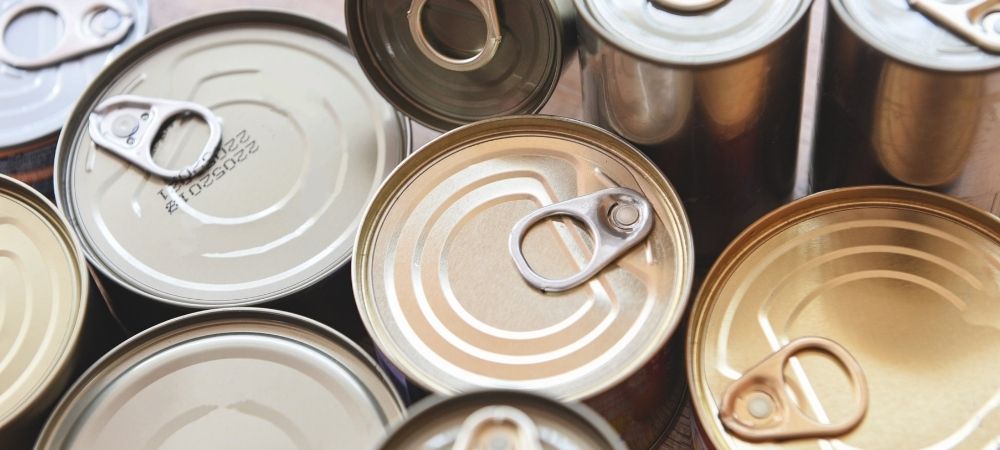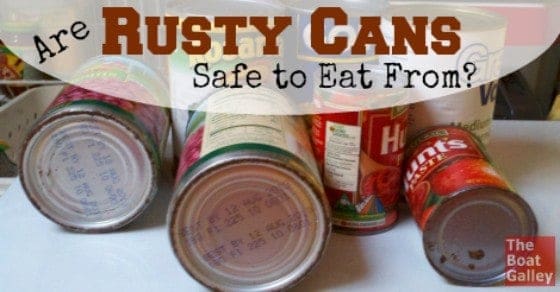No, rusty cans are not safe. Rusty cans can contain harmful bacteria and other contaminants that can make people sick. Rust itself is not toxic, but it can be a sign of corrosion inside the can which means the food or beverage stored in the container could be contaminated with dangerous bacteria like E. coli or Salmonella.
Additionally, rust on cans may indicate that there are holes present in the container which further increase the risk for contamination as well as spoilage of whatever is inside them. It’s best to always check canned goods before using them to ensure they’re still sealed properly and aren’t too rusted before consumption or use of any kind.
Rusty cans can seem like a harmless part of our environment, but they may have more potential harm than you think. Rusty cans can contain dangerous toxins that leach into the surrounding soil and water, which can be harmful to both people and wildlife. It’s important to understand the risks associated with rusty cans so that we can make sure nobody is exposed to them.
What Type of Cans Should Be Avoided?
When it comes to choosing cans for food and beverage storage, there are certain types that should be avoided. Aluminum cans contain a type of plastic lining inside the can that can leach chemicals into the contents over time. This is especially true with acidic beverages like soda or fruit juices as well as canned foods such as tomatoes.
Additionally, some aluminum cans may have been lined with a chemical called bisphenol A (BPA) which has been linked to reproductive issues in humans and animals. In addition, steel cans often contain BPA-based epoxy resins in their lids which pose similar health risks when exposed to heat or acidity. For these reasons, it’s best to avoid both aluminum and steel cans whenever possible and opt for glass containers instead since they do not contain any potentially harmful chemicals.
Are Damaged Cans Safe?
We all know that cans are a great way to store food for long periods of time without it going bad, but what happens when the can is damaged? The answer may surprise you. While there are certain types of damage that render cans unsafe for consumption, in many cases, damaged cans can still be used safely with some extra care.
First and foremost, if you notice any visible signs of rust on the outside or inside of the can then it should not be considered safe to eat from. In addition to rusting metal being an indicator that the contents have been exposed to air and bacteria, any dents or punctures which could have allowed contaminants into the product should also be avoided as they present a risk of contamination. If either of these issues occurs then it is best to discard the product immediately as consuming anything from a compromised container comes with health risks.
However, if your can has only minor cosmetic damage such as scratches and scrapes along its exterior then it should still be fine for use provided you take additional steps before consuming its contents. Before using these products make sure you inspect them thoroughly by looking at both sides for any areas where air may have entered through jagged edges caused by mishandling during transport or storage and check for bulging lids which indicate gas build-up due to spoilage within. Additionally before opening these containers run them under hot water first so that any potential toxins released do not contaminate other surfaces around your kitchen space during preparation or consumption once opened – this will help reduce your risk even further!
Overall while damaged cans may pose health risks depending on their level of destruction, taking some precautionary measures prior to using them could mean they are still safe enough to consume provided they don’t show signs like rusting metal or puncture wounds indicating contamination has occurred.
Is It Safe to Eat Out of a Metal Can?
Eating out of a metal can is generally considered safe, as long as the item you’re eating has been canned properly and is up to date with health regulations. It’s important to inspect the can before opening it, making sure there are no dents or rust spots that could potentially contaminate your food. If you do find any signs of damage on the can, throw it away immediately and don’t consume its contents.
Cans should also be opened with caution: avoid using sharp objects like knives or scissors to open cans in order to prevent contamination from shavings of metal getting into your food. Additionally, after opening a can, make sure not to keep any leftovers – always discard them within two hours after being exposed to air so bacteria doesn’t get a chance to grow on your food. Lastly, ensure that all cans used for storing foods have been cleaned regularly and dried off completely so they don’t become breeding grounds for bacteria growth either inside or outside the container.
Following these simple steps will help ensure that when eating out of a metal can, you remain safe and healthy!
When Should You Not Eat Canned Food?
Canned food can be a great convenience for those on the go, but there are certain times when it’s best to avoid eating canned foods. Canned foods that have been left in storage too long can develop bacteria growth and spoilage due to their lack of air circulation. If you find cans that are bulging or dented, they should not be eaten as this is an indication of possible contamination from the outside environment and/or internal pressure build-up.
Additionally, if a can has expired its expiration date then it should also not be consumed as nutritional value decreases over time. Lastly, any canned food items with signs of leakage or rusting should absolutely never be eaten as they may contain harmful toxins and bacteria which could cause serious illness or even death. When in doubt about the safety of any canned goods always err on the side of caution and discard them into the trash instead of consuming them!

Credit: food.unl.edu
What Happens If You Accidentally Eat Rust
If you accidentally eat rust, it won’t necessarily damage your body since the particles are too large to be absorbed by your digestive system. However, if a large amount of rust is consumed or if any pieces become lodged in the throat or esophagus, irritation, and injury can occur. It’s best to seek medical attention immediately if this happens as serious health complications may arise.
How to Keep Food Cans from Rusting
To keep food cans from rusting, store them in a dry place and avoid exposing them to moisture or humidity. Make sure they are tightly sealed when not in use, as even the smallest amount of air can cause corrosion. Additionally, be careful when handling rusty cans – always wear gloves to prevent skin contact with rust which could lead to infection.
Can You Get Tetanus from Eating Rust
No, you cannot get tetanus from eating rust. Tetanus is a bacterial infection that enters the body through contaminated cuts or wounds and affects the nervous system. Eating rust does not provide any direct exposure to bacteria associated with the disease, so it cannot cause an infection.
However, if there are sharp pieces of metal or wood mixed in with the rust you may be exposed to tetanus-causing bacteria from those objects, so it’s best to avoid ingesting them completely.
Rust on Canned Food Lid
Canned food lids are often made from steel that has been treated with a coating of rust-resistant paint. However, over time, the paint may wear away and cause the lid to become vulnerable to corrosion and rusting. The best way to prevent this from happening is to wash your canned food lids with warm soapy water after each use, then dry them thoroughly before putting them back in the cans.
Additionally, storing them in a cool dry place will help slow down any potential rust formation.
Rusted Canned Food
If you open a can of food and the contents appear rusty or discolored, it is not safe to eat. Rust on canned foods is caused by corrosion of the metal lid and container, which can be an indication that the food inside has been exposed to air or moisture and may contain bacteria. If your canned food appears rusty, discard it immediately rather than taking any chances – as there is no way to tell if it is still safe for consumption.
Are Rusty Kitchen Utensils Dangerous
Rusty kitchen utensils can be dangerous to use, as rust may contain lead or other heavy metals that can contaminate food and cause health problems. In addition, rust particles are sharp and may scratch dishes or cut skin. It is best to replace rusty items with new ones rather than try to clean them in order to avoid any potential risks.
Discoloration Inside Canned Food
When canned food is stored in a cool, dry place and its shelf-life isn’t exceeded, you should generally not have anything to worry about regarding discoloration inside. However, if the can have become dented or damaged in some way, it’s important to check the contents for any signs of spoilage – such as discoloration – before consuming them. If there’s an off odor or slime present along with the discolored areas of food inside the can, then this could be indicative of spoilage due to bacterial growth.
In these cases, it is best to discard the product immediately in order to avoid potential health risks caused by consumption.
Ingesting Rust While Pregnant
It is not advisable to ingest rust while pregnant, as it can contain lead and other potentially hazardous metals that could be harmful to the developing fetus. Ingesting even small amounts of toxic substances during pregnancy may increase a baby’s risk of birth defects or other health complications. For this reason, it is important to avoid the consumption of any substance that may contain rust while pregnant.
Conclusion
In conclusion, although rusty cans may appear to be harmless and safe for use, it is not recommended that you consume food or drinks from a rusted can. The rust itself may contain harmful contaminants which could lead to serious illnesses if consumed. It is always best to inspect any canned food before consuming it and avoid using rusty cans altogether for your own safety.

